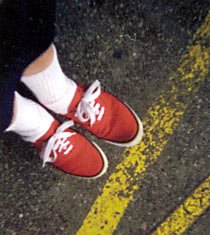And there are no journal articles. And there are anecdotal events on the internet that happened two years ago in international schools in places like Israel. And librarians in international schools don't even know that a grown up TCK is an ATCK (adult third culture kid) not a TCG (third culture grown-up.)
Do you even know what a TCK is? Have I ever even written about this on this blog? Not likely. Why? It's not because (as I thought earlier) that we don't have a strong culture. No, it's because our culture is one of silence and white lies.
Denizen, an online magazine for TCKs, says it best in the article, "White Lies TCKs Tell:"
Within the Third Culture Kid (TCK) community, distaste for the “Where are you from?” strikes a common chord. It’s indicative of the confused identity that comes innately with a TCK status. According to The Washington Post, TCKs make an average of eight major moves before graduating from high school. It’s what separates us from immigrants or casual travelers, because instead of developing our identity and worldview in one locale and then leaving, we develop these characteristics while in constant transit. This is why, according to Pollock and Van Reken’s “Third Culture Kids”, people can be former expats or former foreign service officers, but never a former Third Culture Kid. We take our world with us wherever we go.
But not everyone else understands this. And this is why we do a “little dance” every time we’re asked about our identity. It’s not only because we’re unsure ourselves, but also because we’re unsure of the reactions we’ll get.
I've been reading my way through Dakota by Kathleen Norris. This morning's bit brought me to talking about why there are so few Dakotan writers. Since I have been wondering why there are so few TCK writers, I perked up. And it came to me. No one is telling our stories, so we don't know how to tell them. We are a strong culture, but one of silence. We want to fit in. So we don't tell you that we moved between five different countries before we were 12. We don't tell you we had household help when we lived in developing countries. We don't tell you that we're not sure if we watched TV shows like "Little House on the Prairie" in English or Spanish. Because we don't want to stick out. We just want to fit in, now that we are on native soil.
So we don't start our stories with, well, when I lived in Bonn, the river flooded every spring, because we have been burned. What was it like? Did you learn German while you were there? Did you see the Berlin Wall? We don't say, well, in the second house in Tegucigalpa was really modern. It had a garage on the street level, steps up to a small terrace, and then steps up to a big patio. I remember my grandmother sitting there, reading me from Lad, A Dog, when she came to visit. Then you went in the door, and the living room was on the left. It had a huge cathedral ceiling, and on the side, steps to the dining room. If you went to the right when you came in, you came to the "study" which was really just where the piano and the TV were. Oh, and my loft. The only place where the maid wasn't allowed, although one year I came back from summer vacation and it was clear she'd been up there to straighten. And then I can't finish telling you about the house because I feel the need to explain why we had household help, something that is very rare in middle class America. We had one live-in maid, and one who came occasionally to do other things. In Honduras, you had to boil the water before you drank it. And we often had bomb scares at school. We'd all file out of the school and sit on the front lawn while the building was searched. And we'd sit on the lawn and look at the bumps in the grass. Do you suppose that is a bomb? And some kids bought mango in vinegar with salt in baggies from the man on the other side of the fence. I never did. (I was a real goody two shoes.)
Can you imagine as a seventh grader, explaining all that to your new best friend, whose parents were first generation immigrants from Greece and whose mother was a seamstress and whose father managed a restaurant? You'd sound like a Trump. And that was the last thing you wanted. Blend. Blend. Blend. I didn't have any friends who were TCKs in junior high, high school, or even college. There are TCKs in Pittsburgh, but I only sort of know them, and I don't know if they remember that I am one. All of them are MKs, a subset of the TCK culture: Missionary kids. I'm a diplomat's daughter. So I'm not a military Brat (another subset), or an MK. So what am I? I'm a diplomat's daughter, which is just as explainable as the daughter of an economist. It's not the sort of thing you can explain in ten words or less. A dentist? People know what that is. A seamstress? yep. A teacher? yes. But what the heck does a diplomat do? Well...and then you get into a long convoluted conversation and people's eyes glaze over.
And what I've been finding, is that the writers who ARE TCKs write about either/or. They write about the folk stories of the countries they've lived in, or they write about the country they are from. There is very little fiction about kids who straddle two cultures, trying to figure out who they are as they move from country to country.
I've written enough for now. I need to sleep. But this has been eating me for the past week, and I needed to get it out.


8 comments:
i just counted. I've done 4 posts (including this one) with the label TCK. And none of them really talk about what a TCK is except for this one. That's from a blog where in my most prolific year (2006) I wrote 504 posts. That's a lot of writing that doesn't talk about the bedrock (shifting sands?) of my childhood.
xo,
SL
I just sent a link to this post to a friend who shares your ATCK identity.
Hey SL... I hope you find your way through this box, because imho this is some of the best content you've posted here.
Peace :)
Thanks Helen, Thanks Erin. It feels good to write about, to have conversations about it. It's like WHOOSH and the flood gates open.
xo,
SL
SL,
I've read your blog for years. I'm an ATCK (army brat). A post-college roommate introduced me to the term, tck. She says that we are from the same country. When I am particularly frustrated with living as an invisible ATCK, I dream about a country where the entire population are TCKs.
Thank you for your comment about TCKs being different from immigrants. I have been living around many more immigrants and had lost that nuance when explaining "where I'm from."
In terms of writers, I think Robin McKinley is my favorite (in general, but also as a TCK author). Have you read her?
EMS,
thanks for commenting! Glad to know I have TCK readers!! I do like Robin McKinley. Rose Daughter is one of my favorites. A friend keeps telling me I have to read the Blue Sword but I haven't yet.
I love that image, that we are all from one country. When I think of my "hometown" it is all the people I lost along the way, and somehow it is located in front of my elementary school at the American School of Tegucigalpa.
xo,
SL
Thanks for the kind words on my blog! I would love to cross-link your latest entry on my blog, if that's okay? Love your stuff! I am a librarian too (finished MLIS in May 2010, still looking for a job, blech) so we have a lot in common!!
Liz, you can totally link me. And as librarians, we should talk. I think my email is listed on my blogger profile. I'm in the middle right now of writing the research proposal for my "further study" and there is so little about TCKs and libraries it makes me want to cry. (Except that it gives me a chance to butt in and say, hey, this is a really viable research project!) So glad to meet you!
xo,
SL
Post a Comment